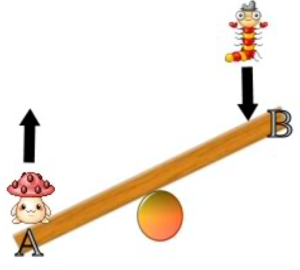Paradoxical coaching is an effective approach when clients resist changes they need to make. We often resist changes we need to make.

What is Paradoxical Coaching?
Your client identified his goals and commited to work on them. He’s invested and motivated but has trouble letting go of old ways. He’s stuck with half his energy on the NO side of the see saw and the other half on the YES side.
When clients exert energy on the NO side, coaches often remind clients of their BIG goals. We present the logical case for how letting go of old behaviors and adopting new ones is necessary to achieve these goals. All is well if the coach stops here. Recently I didn’t and here’s what happened.
The client sensed how much energy I was expending on getting him to move to the YES side of change. He responded by exerting more energy on the NO side. The client was struggling with me, the coach, instead of with his own internal conflict between holding on to old ways versus letting go and trying something new.

What should I have done instead? The answer is paradoxical coaching.
Instead of taking a position on either side of the see saw, the coach steadies herself at the exact midpoint of the client’s ambivalence. She grounds herself there and doesn’t move, not one inch. Instead, she uses that midpoint as a podium from which to illuminate the client’s struggle.
Paradoxical Coaching Vignette
Javier is a super sales person. He’s relationship-oriented, likes to be part of a team and leads from a position alongside his team-mates. But Javier doesn’t lead from the front when the team needs him to. He doesn’t provide efficient processes and structures and isn’t well organized. As an individual contributor and mentor the negative effects of these weak spots are limited. The impact, however, is more widespread when Javier is in charge of the team. Dan, Javier’s manager and VP, global sales, see Javier’s strengths as well-suited for a business development role. Important aspects of managing a team, however, play to his weaknesses.
Javier feels slighted and wants to prove Dan wrong (ego). Dan doesn’t want to push Javier into a role he doesn’t want. Instead, he refers Javier for coaching.
We agree Javier will identify the elements and intersection of:
- What he enjoys doing
- What’s important to him
- What he does well
- What the company needs
Getting Started
Javier and I do a values identification exercise to answer those questions. We discover achievement, relationships and teamwork are his top three values. He fulfills these values by:
- Solving challenging problems
- Doing the right thing
- Acting with integrity
- Helping people
- Crediting others’ achievements
- Empathizing, caring and understanding
Javier shines when his work satisfies these values. But nothing in this hierarchy screams manager or leader. We have a rich discussion about how Javier’s values connect to his performance, satisfaction and happiness. Javier decides to accept the business development role.
Ambivalence Arises
Next time we meet, he flips. “I haven’t had the right opportunity to prove I can lead. I want to show Dan he’s wrong about me.
Javier pauses. I wait.
“It’s my ego that wants to prove I can manage a team.”
“That’s a significant insight. Tell me more.”
Javier no longer occupies the resistant side of his ambivalence. He’s observing it, thereby freeing himself from the grip of what was holding him back.

